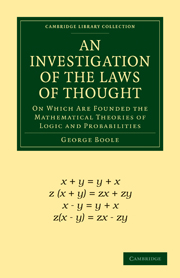 An Investigation of the Laws of Thought
An Investigation of the Laws of Thought Book contents
- Frontmatter
- PREFACE
- Contents
- CHAPTER I NATURE AND DESIGN OF THIS WORK
- CHAPTER II SIGNS AND THEIR LAWS
- CHAPTER III DERIVATION OF THE LAWS
- CHAPTER IV DIVISION OF PROPOSITIONS
- CHAPTER V PRINCIPLES OF SYMBOLICAL REASONING
- CHAPTER VI OF INTERPRETATION
- CHAPTER VII OF ELIMINATION
- CHAPTER VIII OF REDUCTION
- CHAPTER IX METHODS OF ABBREVIATION
- CHAPTER X CONDITIONS OF A PERFECT METHOD
- CHAPTER XI OF SECONDARY PROPOSITIONS
- CHAPTER XII METHODS IN SECONDARY PROPOSITIONS
- CHAPTER XIII CLARKE AND SPINOZA
- CHAPTER XIV EXAMPLE OF ANALYSIS
- CHAPTER XV OF THE ARISTOTELIAN LOGIC
- CHAPTER XVI OF THE THEORY OF PROBABILITIES
- CHAPTER XVII GENERAL METHOD IN PROBABILITIES
- CHAPTER XVIII ELEMENTARY ILLUSTRATIONS
- CHAPTER XIX OF STATISTICAL CONDITIONS
- CHAPTER XX PROBLEMS ON CAUSES
- CHAPTER XXI PROBABILITY OF JUDGMENTS
- CHAPTER XXII CONSTITUTION OF THE INTELLECT
- ERRATA
CHAPTER XIV - EXAMPLE OF ANALYSIS
Published online by Cambridge University Press: 05 November 2011
- Frontmatter
- PREFACE
- Contents
- CHAPTER I NATURE AND DESIGN OF THIS WORK
- CHAPTER II SIGNS AND THEIR LAWS
- CHAPTER III DERIVATION OF THE LAWS
- CHAPTER IV DIVISION OF PROPOSITIONS
- CHAPTER V PRINCIPLES OF SYMBOLICAL REASONING
- CHAPTER VI OF INTERPRETATION
- CHAPTER VII OF ELIMINATION
- CHAPTER VIII OF REDUCTION
- CHAPTER IX METHODS OF ABBREVIATION
- CHAPTER X CONDITIONS OF A PERFECT METHOD
- CHAPTER XI OF SECONDARY PROPOSITIONS
- CHAPTER XII METHODS IN SECONDARY PROPOSITIONS
- CHAPTER XIII CLARKE AND SPINOZA
- CHAPTER XIV EXAMPLE OF ANALYSIS
- CHAPTER XV OF THE ARISTOTELIAN LOGIC
- CHAPTER XVI OF THE THEORY OF PROBABILITIES
- CHAPTER XVII GENERAL METHOD IN PROBABILITIES
- CHAPTER XVIII ELEMENTARY ILLUSTRATIONS
- CHAPTER XIX OF STATISTICAL CONDITIONS
- CHAPTER XX PROBLEMS ON CAUSES
- CHAPTER XXI PROBABILITY OF JUDGMENTS
- CHAPTER XXII CONSTITUTION OF THE INTELLECT
- ERRATA
Summary
EXAMPLE OF THE ANALYSIS OF A SYSTEM OF EQUATIONS BY THE METHOD OF REDUCTION TO A SINGLE EQUIVALENT EQUATION V = 0, WHEREIN V SATISFIES THE CONDITION V (1 − V) = 0.
1. Let us take the remarkable system of premises employed in the previous Chapter, to prove that “Matter is not a necessary being;” and suppressing the 6th premiss, viz., Motion exists,—examine some of the consequences which flow from the remaining premises. This is in reality to accept as true Dr. Clarke's hypothetical principles; but to suppose ourselves ignonorant of the fact of the existence of motion. Instances may occur in which such a selection of a portion of the premises of an argument may lead to interesting consequences, though it is with other views that the present example has been resumed. The premises actually employed will be—
If matter is a necessary being, either the property of gravitation is necessarily present, or it is necessarily absent.
If gravitation is necessarily absent, and the world is not subject to any presiding intelligence, motion does not exist.
If gravitation is necessarily present, a vacuum is necessary.
If a vacuum is necessary, matter is not a necessary being.
If matter is a necessary being, the world is not subject to a presiding intelligence.
If, as before, we represent the elementary propositions by the following notation, viz.:
x = Matter is a necessary being.
y = Gravitation is necessarily present.
w = Motion exists.
t = Gravitation is necessarily absent.
z = The world is merely material, and not subject to a presiding intelligence.
v = A vacuum is necessary.
Information
- Type
- Chapter
- Information
- An Investigation of the Laws of ThoughtOn Which Are Founded the Mathematical Theories of Logic and Probabilities, pp. 219 - 225Publisher: Cambridge University PressPrint publication year: 2009First published in: 1854